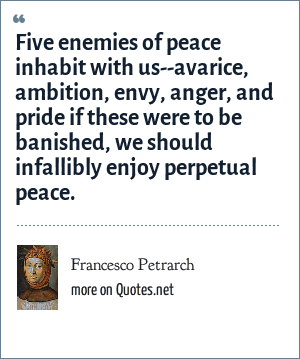“Five enemies of peace inhabit with us--avarice, ambition, envy, anger, and pride if these were to be banished, we should infallibly enjoy perpetual peace.
- 1,180 Views
Translation
Find a translation for this quote in other languages:
cinque nemici della pace abitano con noi: avarizia, ambizione, invidia, ira e orgoglio, se questi dovessero essere banditi, dovremmo infallibilmente godere della pace perpetua.
vijf vijanden van vrede leven bij ons - hebzucht, ambitie, afgunst, woede en trots als deze zouden worden verbannen, zouden we onfeilbaar eeuwige vrede moeten genieten.
சமாதானத்தின் ஐந்து எதிரிகள் நம்முடன் வசிக்கிறார்கள் - பேராசை, பேராசை, பொறாமை, கோபம் மற்றும் பெருமை இவைகளை விரட்டியடிக்க வேண்டும் என்றால், நாம் தவறாமல் நிரந்தரமான அமைதியை அனுபவிக்க வேண்டும்.
beş barış düşmanı bizlerle birlikte yaşar - istila, hırs, kıskançlık, öfke ve eğer bunlar kovulursa gurur, sürekli barıştan zevk almalıyız.
Select another language:
- - Select -
- 简体中文 (Chinese - Simplified)
- 繁體中文 (Chinese - Traditional)
- Español (Spanish)
- Esperanto (Esperanto)
- 日本語 (Japanese)
- Português (Portuguese)
- Deutsch (German)
- العربية (Arabic)
- Français (French)
- Русский (Russian)
- ಕನ್ನಡ (Kannada)
- 한국어 (Korean)
- עברית (Hebrew)
- Gaeilge (Irish)
- Українська (Ukrainian)
- اردو (Urdu)
- Magyar (Hungarian)
- मानक हिन्दी (Hindi)
- Indonesia (Indonesian)
- Italiano (Italian)
- தமிழ் (Tamil)
- Türkçe (Turkish)
- తెలుగు (Telugu)
- ภาษาไทย (Thai)
- Tiếng Việt (Vietnamese)
- Čeština (Czech)
- Polski (Polish)
- Bahasa Indonesia (Indonesian)
- Românește (Romanian)
- Nederlands (Dutch)
- Ελληνικά (Greek)
- Latinum (Latin)
- Svenska (Swedish)
- Dansk (Danish)
- Suomi (Finnish)
- فارسی (Persian)
- ייִדיש (Yiddish)
- հայերեն (Armenian)
- Norsk (Norwegian)
- English (English)
Quote of the Day Today's Quote | Archive
Would you like us to send you a FREE inspiring quote delivered to your inbox daily?
Citation
Use the citation below to add this quote to your bibliography:
Style:MLAChicagoAPA
"Francesco Petrarch Quotes." Quotes.net. STANDS4 LLC, 2025. Web. 15 Feb. 2025. <https://www.quotes.net/quote/16357>.







Discuss this Francesco Petrarch quote with the community:
Report Comment
We're doing our best to make sure our content is useful, accurate and safe.
If by any chance you spot an inappropriate comment while navigating through our website please use this form to let us know, and we'll take care of it shortly.
Attachment
You need to be logged in to favorite.
Log In